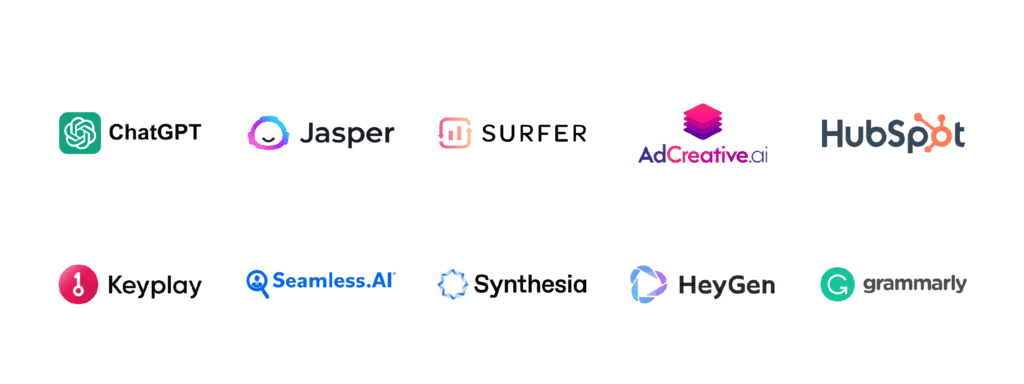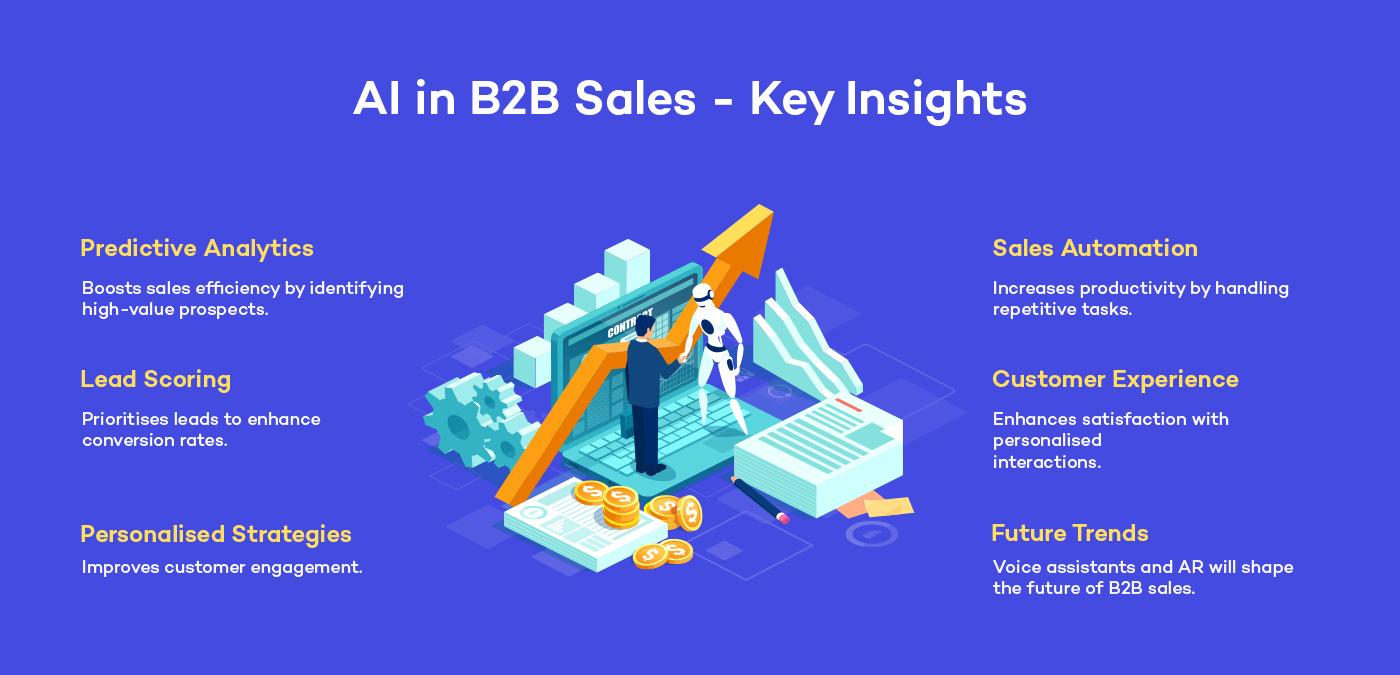How Growth Systems For B2B supports data-driven decision-making
The Future of B2B: Utilizing AI Automation to Drive Success
The landscape of B2B is changing as business increasingly transform to AI automation for calculated advantage. This transformation assures to improve efficiency and consumer interaction through innovative modern technologies. Nevertheless, the integration of these devices is not without its difficulties. Understanding exactly how companies can browse this progressing terrain will be crucial for future success. What variables will establish the effectiveness of AI in this industry? The answers may redefine traditional organization versions.
Comprehending AI Automation in B2B
As organizations progressively look for efficiency, recognizing AI automation in B2B becomes crucial. AI Automation For B2B. AI automation describes the use of expert system innovations to enhance and improve organization procedures. In the B2B field, this involves the assimilation of AI tools to handle jobs such as data evaluation, customer communications, and supply chain procedures. By leveraging device learning and natural language processing, business can boost precision, decrease human error, and accelerate decision-making. AI automation helps with the handling of big quantities of information, allowing organizations to remove valuable insights and optimize their operations. As organizations navigate this technological landscape, a detailed grasp of AI automation's capabilities will equip them to stay competitive and responsive to market demands
Key Benefits of AI Automation for Services
While lots of organizations face raising functional needs, AI automation offers countless benefits that can noticeably boost their performance. One substantial benefit is performance; AI systems can execute repetitive jobs much faster and with higher precision than human beings, thereby freeing and minimizing mistakes up employees for even more critical efforts. Furthermore, AI automation allows data-driven decision-making by examining large datasets swiftly, supplying understandings that notify organization strategies. Price decrease is another vital benefit, as automation minimizes labor prices and enhances resource appropriation. Additionally, AI can enhance scalability, permitting companies to adjust to market modifications swiftly. Inevitably, the combination of AI automation promotes development, enabling firms to stay affordable in a quickly evolving landscape.
Changing Client Experiences With AI
AI is reshaping consumer experiences by enhancing and enabling customized communications involvement. Via the implementation of predictive analytics, companies can anticipate consumer demands and choices, resulting in much more tailored services. In addition, enhancing support processes with AI innovation improves efficiency and contentment, ultimately changing the overall consumer trip.
Personalized Communications and Interaction

Anticipating Analytics Application
As organizations progressively look for to improve client experiences, executing predictive analytics has actually become an essential approach in the B2B sector. By leveraging data-driven insights, companies can expect client requirements and choices, allowing them to customize their offerings better. Anticipating analytics makes use of historic data and sophisticated formulas to forecast future behaviors, allowing companies to determine prospective obstacles and chances. This proactive strategy not only enhances customer contentment but additionally fosters commitment by supplying prompt and appropriate services. In addition, anticipating analytics helps in source appropriation, ensuring that advertising and marketing efforts are focused on high-value prospects. Eventually, the assimilation of predictive analytics gears up B2B firms with the devices required to change consumer interactions and drive long-lasting success in a significantly competitive landscape.
Improving Assistance Procedures
Enhancing consumer experiences in the B2B industry prolongs past anticipating analytics; improving support procedures plays an important function. By incorporating AI-driven services, services can improve and automate regular inquiries action times, bring about heightened client satisfaction. Chatbots and online aides supply 24/7 assistance, resolving customer requires promptly and decreasing the concern on human representatives. This automation permits groups to concentrate on intricate issues, promoting more purposeful communications. Furthermore, AI tools can evaluate support data to identify trends and areas for enhancement, making sure continual enhancement of service top quality. Minarik AI. As organizations embrace these innovations, they position themselves as responsive and customer-centric, eventually driving commitment and service growth in a significantly competitive landscape
Improving Workflow and Processes
Improving procedures and procedures in B2B settings is crucial for enhancing overall effectiveness. By enhancing workflow efficiency and automating routine tasks, companies can lower hand-operated mistakes and liberate useful sources. This shift not only improves productivity yet additionally allows groups to concentrate on calculated campaigns that drive development.
Maximizing Workflow Efficiency
Optimizing process performance is important for services looking for to enhance and minimize functional costs productivity. By examining existing procedures, organizations can identify traffic jams and redundancies that prevent efficiency. Implementing streamlined procedures boosts communication and collaboration amongst groups, making certain that jobs are finished a lot more quickly. Utilizing data-driven insights enables companies to make informed choices that refine procedures additionally. Furthermore, adopting incorporated innovations can help with smooth details circulation, reducing the threat of mistakes and hold-ups. As companies welcome these modifications, they not just foster an extra active work setting however likewise place themselves to react quickly to market demands. Eventually, concentrating on operations efficiency allows organizations to allot resources successfully, driving lasting success in a progressively affordable landscape.
Automating Regular Tasks
Lots of companies are increasingly turning to automation to take care of routine tasks, acknowledging its possible to considerably enhance functional efficiency. By releasing AI-driven solutions, firms can enhance repetitive tasks such as data access, invoice handling, and customer queries. This change not just lowers human mistake yet also releases up important worker time, permitting staff to focus on calculated campaigns and value-added tasks. In addition, automation can improve action times and solution uniformity, leading to improved consumer complete satisfaction. As organizations browse an affordable landscape, leveraging automation for routine tasks ends up being important for maximizing workflows and maintaining dexterity. Ultimately, this method promotes advancement and drives growth, positioning companies for lasting success in the developing B2B setting.
Enhancing Decision-Making Via Information Insights
As businesses browse an increasingly complex landscape, leveraging information understandings ends up being important for informed decision-making. Minarik AI. By utilizing ai-driven devices and advanced analytics, organizations can transform raw data into actionable intelligence. This allows them to identify fads, projection market adjustments, and enhance methods based upon real-time details. Boosted decision-making procedures rely on data visualization methods, enabling stakeholders to quickly translate intricate datasets and make swift, evidence-based selections. Additionally, insights stemmed from client habits and market dynamics encourage firms to tailor their offerings, enhancing client satisfaction and driving development. Ultimately, taking advantage of information understandings not just enhances decision-making effectiveness but likewise positions businesses to continue to be affordable in a rapidly progressing industry
Overcoming Difficulties in AI Application
Although AI execution holds the promise of considerable functional renovations, organizations commonly encounter a myriad of difficulties that can prevent development. Trick barriers consist of information top quality concerns, as several enterprises have problem with irregular or insufficient datasets required for efficient AI training. Additionally, resistance to alter within the workforce can hinder the fostering of AI innovations, as workers may fear work variation or do not have the necessary abilities. Budget restraints likewise offer a difficulty, restricting investment in the called for facilities and ability. Furthermore, incorporating AI systems with existing you could try these out processes can be intricate, demanding significant time and sources. Getting over these challenges necessitates a tactical strategy that includes extensive training, adjustment management, and a commitment to constant renovation in AI initiatives
Future Patterns: The Following Frontier in B2B Automation
While the landscape of B2B automation remains to develop, arising fads are poised to redefine exactly how companies operate. The assimilation of advanced expert system will certainly facilitate a lot more customized consumer experiences, allowing services to tailor remedies precisely to client needs. The rise of predictive analytics will allow companies to prepare for market shifts and enhance decision-making processes. Automation of regular jobs via robotic process automation (RPA) will improve performance, decreasing operational prices substantially. Additionally, the adoption of blockchain innovation guarantees boosted transparency and protection in transactions. As these developments gain traction, business will progressively utilize AI-driven understandings to foster cooperation, enhance supply chains, and boost total performance, noting a transformative shift in the B2B landscape.
Frequently Asked Questions
What Sorts Of Services Can Benefit Many From AI Automation?

Exactly How Can Small Companies Carry Out AI Automation Efficiently?
Small companies can carry out AI automation efficiently by recognizing repeated tasks, picking easy to use devices, making sure sufficient training for employees, and progressively integrating remedies to enhance workflows while checking efficiency and adjusting approaches based on responses.
What Prevail Misconceptions Concerning AI in B2B?
Typical misconceptions concerning AI in B2B include the idea that it is only for huge business, that it assures immediate results, and that it can fully change human decision-making as opposed to enhancing it.
How Does AI Automation Effect Worker Responsibilities and Job Security?
AI automation improves worker duties by improving recurring tasks, fostering performance and advancement. While some worry task loss, it typically creates possibilities for upskilling and brand-new positions, eventually enhancing work safety and security with added value and efficiency.
What Skills Are Required to Take Care Of AI Automation Projects?
To manage AI automation projects, individuals require strong logical abilities, task management expertise, efficiency in information evaluation, understanding of device discovering principles, efficient communication capacities, and flexibility to rapidly changing technological atmospheres. These abilities assure effective implementation.
As companies progressively look for effectiveness, comprehending AI automation in B2B ends up being necessary. AI automation promotes the handling of huge quantities of information, allowing services to draw out useful understandings and enhance their operations. While lots of services grapple with boosting functional needs, AI automation offers many benefits that can substantially boost their performance. Automation of routine jobs via robot procedure automation (RPA) will enhance performance, lowering functional expenses considerably - B2B Growth Consulting. Production, logistics, and consumer service companies can profit most from AI automation